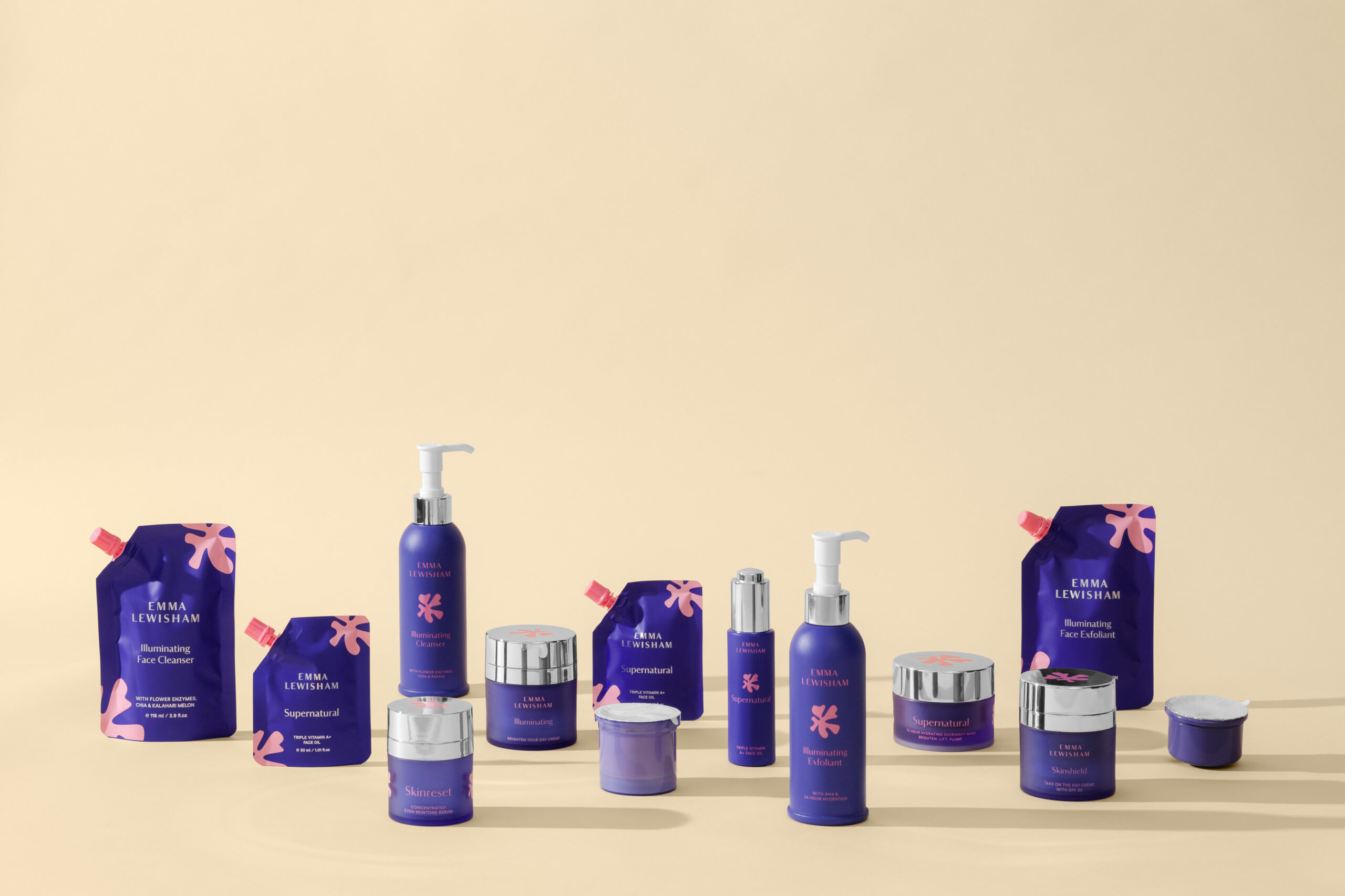Emma Lewisham sets a new benchmark in beauty, announcing it is the world’s first carbon-positive beauty brand and its new 100 per cent circular designed product range.
In a world-first for a beauty brand, Emma Lewisham proudly announces today its carbon positive product range and 100 per cent circular designed business model.
Today, Emma Lewisham will also publicly release its IP for its 100 per cent circular designed product packaging and carbon positive model, enabling small and large competitors alike to capitalise from Emma Lewisham’s investment and to start making widespread change within the beauty industry.
The beauty industry currently produces 120 billion units of waste every year, with the majority of this being non-recycled; this has the largest impact on the industry’s carbon emissions.
Emma Lewisham’s circular, carbon positive business model is the only viable solution to the beauty industry meeting global climate targets.
Furthermore, to validate these world-first achievements, Emma Lewisham has gained written endorsement from iconic environmentalist, ethologist and United Nations Messenger of Peace, Dr Jane Goodall – who is proud to globally support these industry-shifting efforts.
Goodall says, “New Zealand beauty brand, Emma Lewisham, is demonstrating what it means to be a truly sustainable business. Through their carbon positive and circular business model, Emma Lewisham is creating environmental prosperity and showing their peers that this business model is not just possible but paramount if we are to make a meaningful difference.”
Scientifically backed, 100% natural skincare brand from New Zealand, Emma Lewisham has been committed to finding carbon positive and circular solutions to address the beauty industry’s waste and pollution problems since its inception in 2019.

Carbon positive at product level
Lewisham spent 12 months working with worldleading independent environmental certification agency, Toitū Envirocare, to measure the carbon emissions emitted at each stage of its product’s lifecycle and have the brand independently verified as carbon positive at a product level.
Emma Lewisham went further than accounting and compensating for the product footprint to achieve full Toitū climate positive product certification.
The brand sought to measure its emissions throughout its entire supply chain, including the harvesting and production of raw ingredients used, transportation, product packaging and end-of-life for each product in order to put reduction plans in place before positively offsetting what could not be reduced.
Aligning with the urgent objective of the United Nations 2015 Paris Agreement of halving CO₂ emissions by 2030 and reaching net-zero by 2050, when it came to offsetting, Emma Lewisham was clear that it did not just want to neutralise its impact; it wanted to create a positive one as the future of sustainability lies in regeneration.
Emma Lewisham decided to offset its remaining emissions by an additional 25 per cent to become the world’s first beauty brand to be verified carbon positive at a product level.
Lewisham is also clear that offsetting should be the final port of call; reduction should be the priority, saying: “It’s not just about measuring and then offsetting our impact. We are focused on reducing our carbon footprint to the lowest number possible and implementing strategies, such as moving to a circular business model to illustrate this is more than just offsetting for us. We are doing the work. We’d love to be in a position where we eliminate the need to offset altogether.”
Emma Lewisham has allocated 75 per cent of its carbon offset credits to regenerating New Zealand’s Puhoi Forest Reserves, 12.5 per cent to supporting Gyapa’s Cook Stoves technology in Ghana and 12.5 per cent to Malya’s Wind Power Project in India.
Measuring its emissions at a product level has allowed Emma Lewisham to assign a carbon number to each product – showing exactly how many kilograms of carbon (kgCO2e) is emitted to make each individual product.
All of Emma Lewisham’s products are manufactured using 100 per cent renewable energy.
The detailed research, audited by Toitū Envirocare, also established that Emma Lewisham’s refillable product vessels have up to a 74 per cent smaller carbon footprint than that of the original packaging.
Further empowering customers to understand how they can reduce their impact by choosing to partake in Emma Lewisham’s Beauty Circle.
Corporate Carbon Footprint (CCF) vs Product Carbon Footprint (CPF)
It’s important to differentiate between carbon certifications at a product level and a corporate level.
While many businesses globally have measured their Corporate Carbon Footprint (CCF), very few have dedicated the time and resources to measuring the Product Carbon Footprint (CPF).
Emma Lewisham’s refillable product vessels have up to a 74 per cent smaller carbon footprint than that of the original packaging.

Circular designed beauty
All of Emma Lewisham’s products are refillable and 100 per cent designed to fit within a circular system, which is the pinnacle of sustainable achievement.
“Circular designed” means designing out waste, keeping materials in use through reuse, repair and recycling, and regenerating the environment.
It is no longer acceptable for brands to claim recyclability and rely on differentiating local curbside recycling programs.
Packaging is the beauty industry’s number one contributor to carbon emissions, and by moving to a circular model, beauty brands could lower their carbon emissions by 70 per cent.
Emma Lewisham has invested heavily into the research and development of innovative packaging, machinery and business processes that allow each product to be refilled and to ensure packaging end of life is kept in circulation and diverted from landfill.
“There was no roadmap to follow in becoming a circular designed luxury skincare brand. We have had to reimagine our business processes, technology and our product packaging. This is a new model of beauty. It has required strenuous investments in both time and capital; however, there was no other option for us. We believe businesses are uniquely placed to drive change and possess the power to use their resources for the good,”Lewisham says.
“The industry seems to have become so focused on recycling. However, a solution that has a significantly lighter environmental impact – is to reuse – in our case, refill. There must be investment industry-wide into refillable models and reuse of material – recycling should be the final port of call.”
Lewisham is also passionate about educating brands and customers on the unaddressed reality of recycling – that almost no ‘recyclable’ beauty packaging is actually being recycled. For Emma Lewisham, recyclability is defined not by the potential but by what actually happens in practice.
“What people don’t know is that virtually no curbside recycling systems actually recycle beauty packaging. Although products might ‘technically’ be recyclable, the economics just don’t stack up – so to landfill, it goes.”
“If we are to ensure packaging is recycled, we (brands) must take ownership of our materials and work with our customers to take back all packaging globally to be recycled through specialised recycling partners who ensure this happens. Labelling a beauty product ‘100 per cent recyclable’ without a takeback programme and reputable recycling partner in place – should be considered an irresponsible business practice.”

Sharing the blueprint
Although the first to adopt a circular and carbon positive business model in beauty, Emma Lewisham doesn’t want to be the last.
With the hope of accelerating the movement towards a circular beauty industry, Emma Lewisham has shared all intellectual property surrounding the achievement of a circular and carbon positive model with beauty brands around the world here.
The blueprint includes refill designs, sterilising processes, recycling and returns processes, packaging supplier connections, take back procedures and carbon calculation guides.
From today, all brands have access to Emma Lewisham’s extensive research, processes and innovations.
Dr Goodall says, “Emma Lewisham may be setting a new benchmark in beauty, but they are also setting a benchmark for how all industries should be operating – circular, waste-free and carbon positive. I wholeheartedly endorse Emma Lewisham’s Beauty Circle and all the systems they have put in place as a business striving to make the world a better place.”
On the decision to immediately share their knowledge, Emma says; “We genuinely want to see change. The problems we face are so much greater than the success of one business or brand, and if we are going to solve them, collaboration is key. We must tear down the barriers of competition once and for all – unifying around a greater vision where future generations may thrive. This has to be the future of beauty.”
Circular business
A linear business model that extracts resources and then wastes them is not sustainable. For a business to truly be sustainable, it has to be circular.
This means that we design out waste and pollution, we keep the materials we use in circulation, and we regenerate the ecosystems we operate in.
And all of this is to be powered using renewable energy.
This is business in the 21st century.







